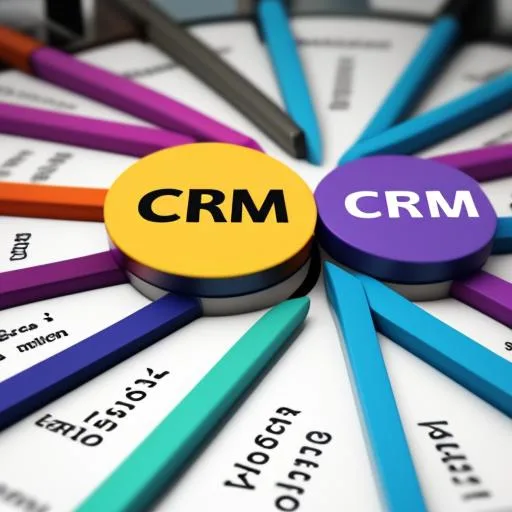If you’ve made it this far, you’re probably wondering: What types of CRM systems are out there, and which one is the best fit for my business? Don’t worry—we’re here to help. In this article, we’ll provide you with all the essential information about the different types of CRMs and guide you on how to choose the one that best suits your company’s needs.
Here’s what we’ll cover:
- What a CRM is
- The different types of CRMs
- Key features of each type
- How to choose the perfect one for you
What is a CRM and why does your business need one?
A CRM, or Customer Relationship Management, is basically a tool that helps you:
- Stay on top of customer interactions
- Keep your sales, marketing, and customer service data organized
- Deliver a better experience for your customers at every step of their journey
What’s the payoff? Happier customers, smoother workflows, and a noticeable boost in sales.
Sounds pretty good, doesn’t it?
Now that you’ve got a solid idea of what a CRM is, let’s dive into the different types available and how they can work for you.
Types of CRM: How many are there and what are they for?
There are three main types of CRMs, each designed to address specific needs:
- Operational
- Analytical
- Collaborative
Some platforms blend features from all three, often referred to as hybrid CRMs. Let’s break down what each type offers.
Operational CRM: The Ultimate Process Organizer
Having trouble staying on top of your contacts, following up with leads, or closing sales? An Operational CRM might be just what you need.
This type of CRM is all about automating and simplifying your core business processes, like:
- Sales Management: Keeping track of leads and opportunities
- Marketing Automation: Handling emails, campaigns, and customer segmentation
- Customer Service: Resolving issues quickly and effectively
Think of tools like HubSpot or Salesforce—they’re pros at centralizing your data and helping you stay organized.
Who’s it best for?
Businesses that want to make their sales, marketing, and support teams more efficient.
Analytical CRM: The smarts behind better decisions
If you love data and want to make smarter, more informed choices, an Analytical CRM is exactly what you need. It helps you:
- Analyze customer behavior patterns
- Segment your database effectively
- Forecast sales trends
For instance, tools like Microsoft Dynamics can turn massive amounts of data into valuable insights, giving you the edge to craft smarter strategies. For instance, tools like Microsoft Dynamics can turn massive amounts of data into valuable insights, giving you the edge to craft smarter strategies.
Who’s it best for?
Companies managing large amounts of data that want to improve their decision-making and drive better results.
Collaborative CRM: Teamwork makes the dream work
If your business relies on smooth communication between teams, customers, and vendors, a Collaborative CRM is a must-have.
This type of CRM helps with:
- Sharing information across departments
- Managing interactions across multiple channels (email, social media, calls, etc.)
- Building stronger relationships with customers
Platforms like Zoho CRM ensure your team operates like a finely tuned machine.
Who’s it best for?
Businesses with multiple teams or locations that need to stay aligned and work together efficiently.
How to choose the right CRM for your business
Finding the perfect CRM comes down to a few key factors. Here’s a quick checklist to guide you:
Define your needs
- Want to streamline your processes? Go with an Operational CRM.
- Love digging into data? An Analytical CRM is the way to go.
- Working with multiple teams? A Collaborative CRM is your best bet.
Think about your budget
CRM pricing can range widely—from free options like HubSpot Free to premium solutions.
Evaluate scalability
Make sure the CRM you choose can grow alongside your business.
Try before you buy
Most platforms offer free trials, so take them for a spin before making a decision.
1. Can I use more than one type of CRM at the same time?
Absolutely! Many businesses combine Operational and Analytical CRMs to get the best of both worlds. There are also hybrid options that integrate multiple functionalities into one system.
2. What’s the best CRM for small businesses?
It depends on your needs, but HubSpot, Zoho, and Pipedrive are often great choices because they’re user-friendly and budget-friendly.
3. Is implementing a CRM difficult?
It doesn’t have to be. Most modern CRMs are intuitive and come with technical support. Just make sure to invest time in training your team to get the most out of the system.
4. Boost your business with marketing and sales automation
Implementing a CRM is an essential step in optimizing your customer relationships, but to truly level up, you need a marketing and sales automation strategy that drives real results.
At Yes Sir Agency, we change the way you engage with your customers by automating processes that save time and increase effectiveness, boosting your overall business performance.Give your business the competitive edge it deserves. Learn more about our Marketing Process Automation service.






